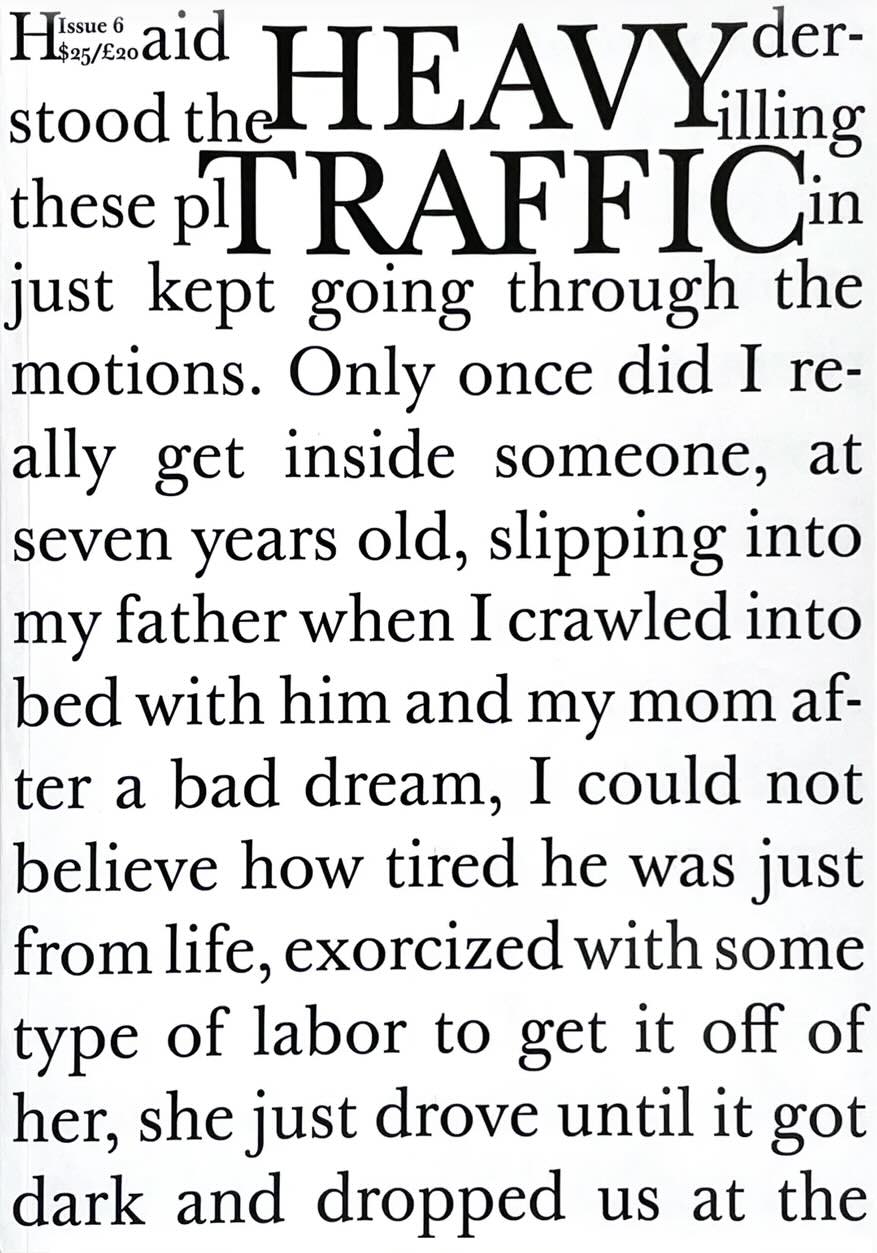
Heavy Traffic 6
Patrick McGraw ed.
Featuring new fiction from Ralph Bakshi, Ottessa Moshfegh, Rachel Kushner, Dean Kissick, Jordan Castro, Zans Brady Krohn, Cara Schacter, Patrick McGraw, Charles Clateman, and Johanna Stone.

Patrick McGraw ed.
Featuring new fiction from Ralph Bakshi, Ottessa Moshfegh, Rachel Kushner, Dean Kissick, Jordan Castro, Zans Brady Krohn, Cara Schacter, Patrick McGraw, Charles Clateman, and Johanna Stone.

In Juggling , Stewart Lawrence Sinclair explores the four-thousand-year history and practice of juggling as seen through his life as a juggler. Sinclair—who learned to juggle as a child and paid his way through college by busking—shares his experiences of taking up juggling after an episode of suicidal ideation, his time juggling on the streets, and ultimately finding comfort in juggling during the COVID-19 pandemic. In many ways, this is a book about loss and recovery. From his own juggling story to clowns braving military checkpoints in Bosnia and Rwanda to perform in refugee camps to contemporary avant-garde performances, Sinclair shows how the universal language of juggling provides joy as well as a respite from difficulties during hard times.

An audacious account of what happens when forgetting becomes a way of writing and writing becomes a way of forgetting.
In Slips of the Mind, poet and critic Jennifer Soong turns away from forgetting’s long-standing associations with suppression, privation, and error to argue that the absence or failure of memory has often functioned as a generative creative principle. Exploring forgetting not as the mere rejection of a literary past or a form of negative poetics, Soong puts to the test its very aesthetic meaning. What new structures, forms of desires, styles, and long and short feelings do lapses in time allow? What is oblivion’s relationship to composition? And how does the twentieth-century poet come to figure as the quintessential embodiment of such questions?
Soong uncovers forgetting’s influence on Gertrude Stein, Lyn Hejinian, Tan Lin, Harryette Mullen, Lissa Wolsak, and New York School poets John Ashbery, James Schuyler, Bernadette Mayer, and Ted Berrigan, among others. She reveals that forgetting’s shapeshifting produces differences in poetic genre, interest, and degrees of intentionality—and that such malleability is part of forgetting’s nature. Most provocatively, Soong shows how losing track of things, leaving them behind, or finding them already gone resists overdetermination and causality in the name of surprise, as poets leverage forgetting in order to replace identity with style. Slips of the Mind is the kind of literary criticism that will reward all readers of modern and contemporary poetry.

Sore is a serial anthology that brings together authors whose writing practices oscillate between the genres of diary keeping and fiction. For the second issue of Sore, ten contributors – both authors and visual artists – were invited to collectively develop their work through a series of informal critiques over the course of five months.
In the first issue of Sore, observations of everyday life intertwined with memories and cultural references to denote the significance of a certain soreness we each carry within us as we negotiate the various challenges of social existence. In this second ensemble, seven new authors widen our understanding of the term ‘sore’ by underlining a need to orient one’s gaze towards what’s hidden underneath, to enter the anatomy of all these necessary contortions and u-turns one performs in order to escape the grip of expected compliance.
With contributions from: Mathilde Heuliez, Lisa Lagova, Muyeong Kim, Nour Ben Saïd, Masha Ryabova, Adrienne Chung, Richard Dmitri Hees, Oscar Le Merle, Morra Kozlitina, Tindra Eliason, Helmer Stuyt, Ilya Stasevich, Kristina Stallvik.
Published by cover crop, Mathilde Heuliez & Lisa Lagova.

Michel Foucault offers an iconoclastic exploration of why we feel compelled to continually analyze and discuss sex, and of the social and mental mechanisms of power that cause us to direct the questions of what we are to what our sexuality is.
![Cover of OEI #94-95 Geografier [Geographies]](https://rile.space/storage/1488/0216_Scan2022-04-15_140650_004.jpg)
Jonas J. Magnusson, Cecilia Grönberg and 1 more
The new publication triangulates between geopoetics, geopolitics, and cultural geography; a 464 page issue with some 50 contributors as well as a large section on Swedish philosophical geographer Gunnar Olsson.